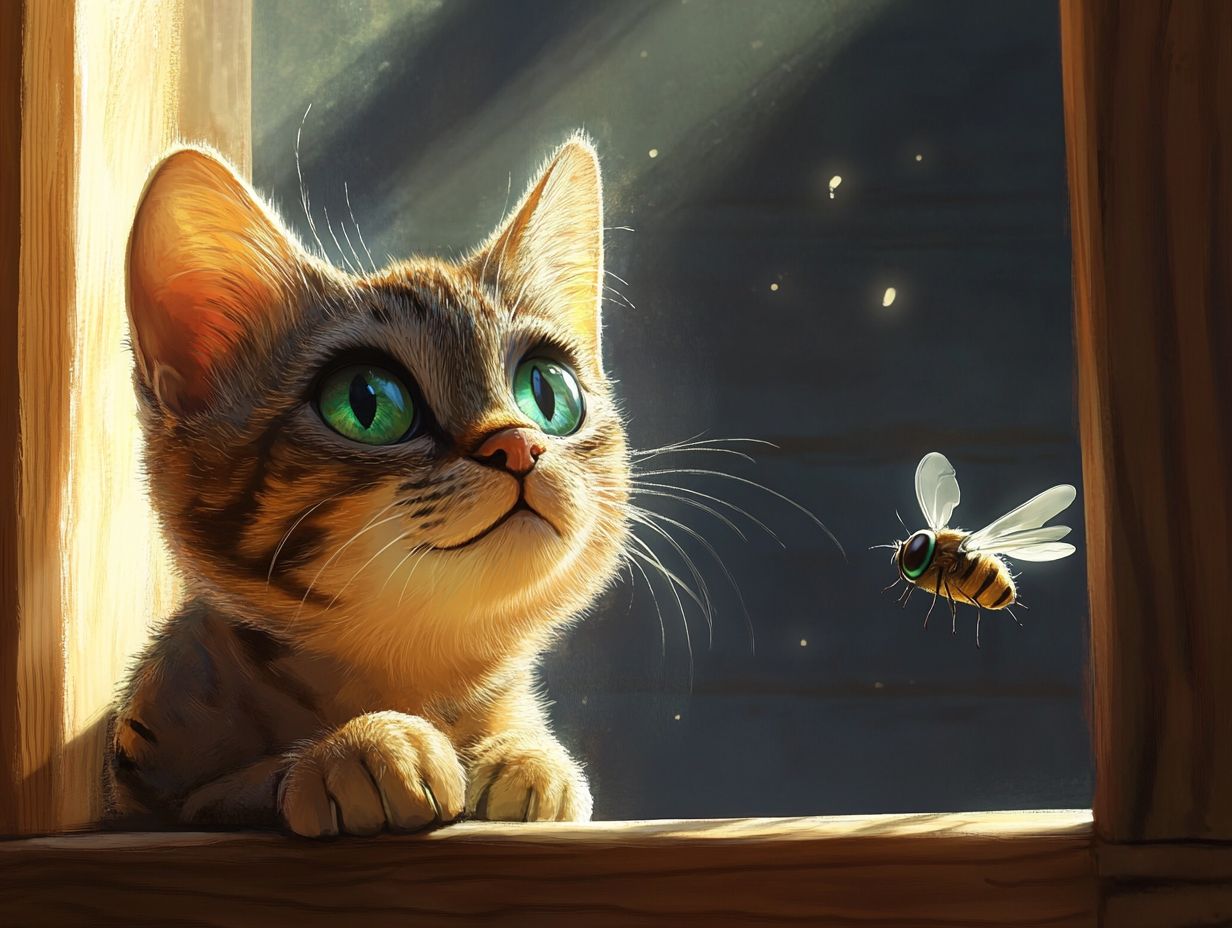If you’ve ever caught your cat stalking a fly, you might wonder whether it’s safe for them to indulge in this tiny snack, given the potential health complications and risks involved.
Cats have a natural instinct to hunt and play, often displaying fascinating feline behaviors. But what happens when they actually catch their prey, like flies?
This article explores whether eating flies is harmful to your furry friend, the potential risks involved—including exposure to microorganisms and diseases—and what you should do if your cat munches on one.
We’ll also share some healthy snack alternatives that fit within a balanced diet and tips to keep those pesky flies away from your curious companion.
Key Takeaways:
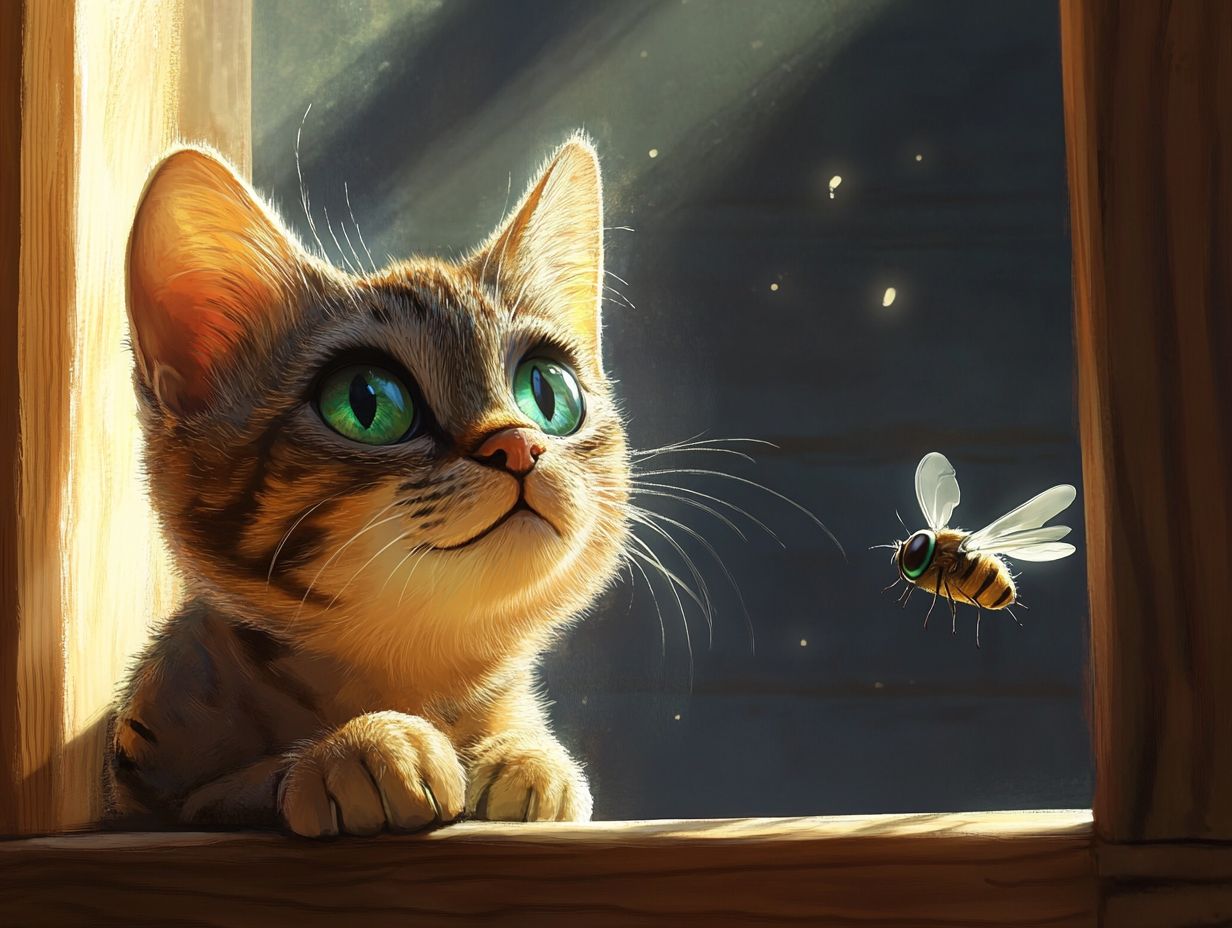
- Cats may be inclined to eat flies, but doing so can pose health risks.
- Ingesting flies can lead to dangers, including choking and exposure to harmful pesticides or diseases.
- If your cat eats a fly, monitor their health closely and consider providing safe, healthy alternatives to reduce their hunting behaviors.
Can Cats Eat Flies?
Cats, being natural hunters, often display intriguing behaviors, including the occasional act of eating flies. This instinct can be traced back to their ancestors, who relied on their hunting prowess to catch prey, including small insects like flies.
While it may seem harmless for a cat to consume an insect or two, it’s important for you as a cat owner to understand the health implications associated with such actions. Knowing how cats interact with their environment helps ensure they maintain a balanced diet.
Exploring a Cat’s Natural Hunting Instincts
Cats are instinctive hunters, and you can see these hunting skills in action when they play with flies and other insects. These behaviors have evolved over millennia for survival.
When a cat spots a buzzing fly, its pupils dilate, muscle tension increases, and it crouches low, mimicking the stealth tactics of wild ancestors. The rapid movements and unpredictable flight patterns trigger an evolutionary response, prompting the cat to pounce, swat, and chase.
This behavior not only enhances their physical agility but also stimulates their minds, reinforcing their roles as skilled predators in a domestic setting.
Potential Dangers of Cats Eating Flies
While risks and health implications exist when cats eat flies, these risks are generally minimal and do not always lead to serious complications.
Occasional consumption may expose cats to microorganisms, such as parasites and bacteria, especially in cats with compromised immune systems. Eating flies can also cause minor health issues like upset stomach and diarrhea, particularly if contaminated.
Therefore, you should keep an eye on your cat for any signs of distress.
Risks of Ingesting Flies
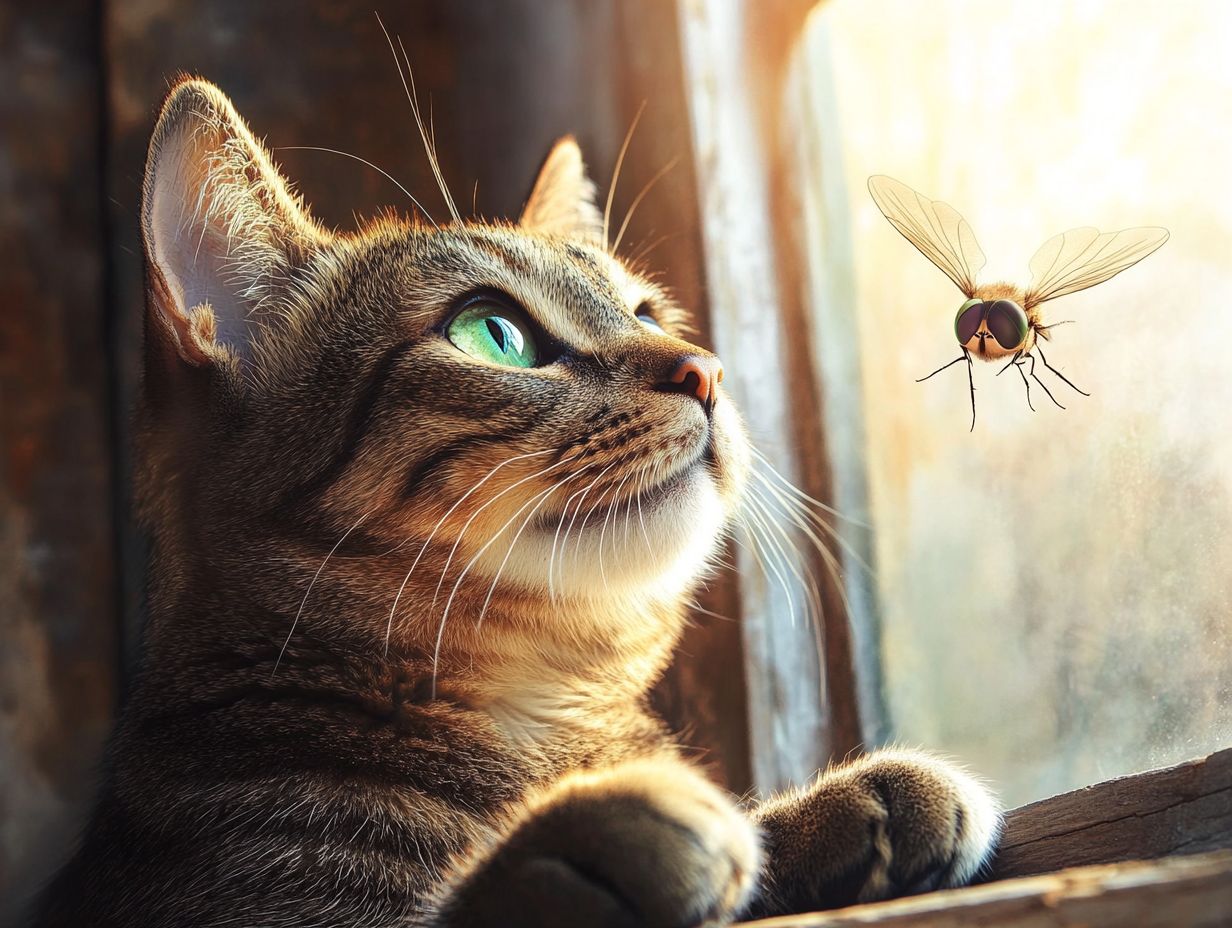
The health risks posed to cats by eating flies are considerable, as these insects can carry bacteria, viruses, and even parasites that may cause gastrointestinal issues. When cats consume flies, they may be exposed to pathogens like Salmonella and E. coli, leading to severe infections. For more information, consult reputable veterinary sources.
Additionally, parasites such as roundworms and tapeworms could negatively impact a cat’s overall health. Regular health checkups and monitoring by a veterinarian are essential for prevention.
These risks can be mitigated by ensuring that cats have a proper diet and are up to date on their vaccinations. Safeguarding their health is vital given the seemingly harmless dangers posed by flies.
What to Do if Your Cat Eats a Fly
If your cat consumes a fly, it’s important to monitor their health for any signs of gastrointestinal upset. Look out for symptoms such as:
- Vomiting
- Diarrhea
- Loss of appetite
- Lethargy
If you notice any of these symptoms, or if your cat appears unwell, consult your veterinarian promptly for further advice.
Conclusion
In summary, while it might seem natural for your cat to chase and eat flies, keep in mind the potential health risks involved. Monitor your cat for any signs of distress, provide them with safe alternatives for play and snacks, and maintain regular veterinary checkups to ensure their well-being.
While cats may occasionally consume flies, it is crucial for pet owners to understand the potential health implications and how to respond effectively. If eating a fly leads to minor health issues, your cat may exhibit signs of vomiting, diarrhea, or other changes in behavior. Should your cat display any concerning symptoms, consulting a veterinarian is essential to ensure its well-being and discuss potential dietary changes.
Healthy Snack Alternatives for Your Cat
Providing cats with healthy and suitable snacks can help prevent them from eating flies, while also ensuring they receive the proper nutrition needed to avoid deficiencies. For more information, check out Can Cats Eat Flies? Is It Safe for Cats?.
Healthy and Appropriate Snacks for Cats
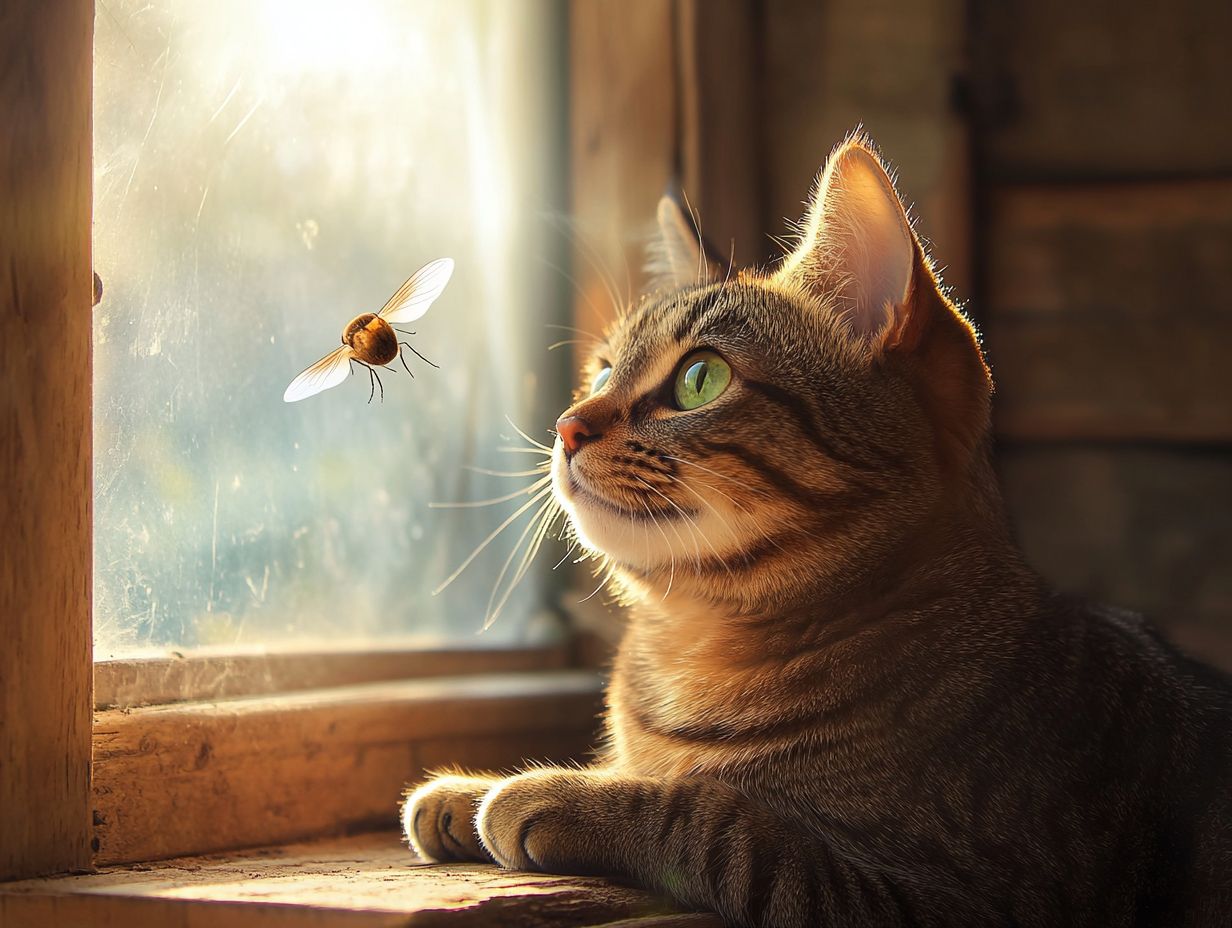
The best way to meet a cat’s nutritional needs and prevent dietary deficiencies is by offering a variety of high-quality pet food and healthy snacks, adhering to their specific nutritional requirements. Limit treats to no more than 10% of your cat’s daily caloric intake.
Freeze-dried meats or fish, high-protein treats, and even fruits like blueberries can serve as excellent alternatives to satisfy a cat’s desire for a diverse diet without unhealthy additives. These snacks not only provide essential vitamins and minerals but also allow cats to indulge their natural hunting instincts.
However, moderation is crucial, as excessive snacking can lead to weight issues. Providing nutritionally balanced snacks tailored to a cat’s individual dietary requirements can enhance their overall health while also appealing to their taste preferences.
Preventing Your Cat from Eating Flies
To effectively prevent your cat from eating flies, it’s essential to employ a multi-faceted approach that addresses both their natural hunting instincts and the health risks associated with consuming flies.
Tips for Keeping Flies Away from Your Cat
- Regularly clean food and water bowls, as leftover crumbs can attract flies.
- Install screens or mesh barriers on windows to help prevent their entry.
- Use natural repellents, such as essential oils like peppermint or lavender, which are safe for cats.
- Groom your cat regularly to reduce potential areas for flies to settle and spread germs.
- Keep windows closed during peak fly seasons or use fly traps to reduce the presence of flies indoors.
Frequently Asked Questions
Can cats eat flies?
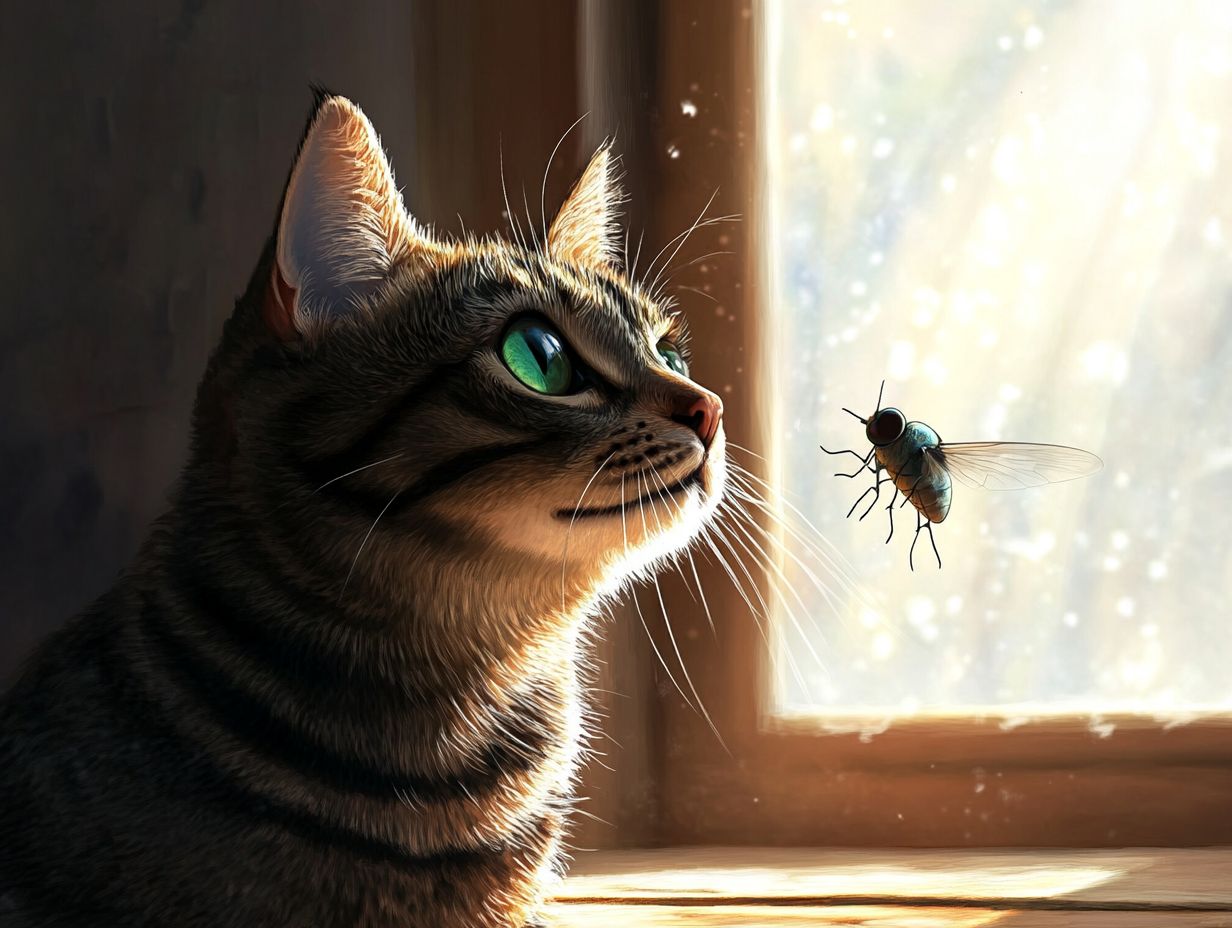
Yes, cats can eat flies. Flies may be a source of protein for cats, and some cats are known to hunt and eat flies.
Is it safe for cats to eat flies?
Generally, it is safe for cats to eat flies. However, it is important to note that flies can carry diseases and parasites that may be harmful to cats.
What are the potential risks of cats eating flies?
The potential risks of cats eating flies include ingesting harmful bacteria or toxins from the flies, as well as potential intestinal problems from consuming large quantities of flies.
Can cats get sick from eating flies?
Yes, cats can get sick from eating flies, especially if the flies are contaminated with bacteria or parasites.
Takeaway: By understanding the risks and taking proactive measures, you can help keep your cat healthy and safe from the potential dangers of consuming flies.
While cats may occasionally eat flies, it’s essential to understand both the potential health risks and the minimal nutritional benefits involved. Yes, cats can get sick from eating flies, as these insects can carry harmful bacteria or toxins that may lead to illness in felines.
Guidelines for Safe Feeding
If your cat eats a fly, monitor their behavior closely. Keep an eye on their appetite, energy levels, and litter box habits. If you notice any symptoms of illness, such as vomiting or diarrhea, consult with a veterinarian promptly. Additionally, it’s advisable to limit the occasional consumption of flies and consider it a rare treat rather than a regular part of their diet.
In conclusion, while flies can pose certain risks to your cat’s health, the occasional consumption may not be harmful. Always prioritize your cat’s overall dietary needs and consult with a veterinarian if you have any concerns.
